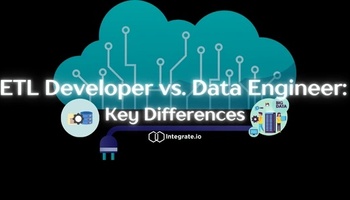- The Shift to the ELT Approach
- The Traditional Data Team: Before the Analytics Engineer
- The Modern Data Team: Introducing the Analytics Engineer
- Analytics Engineer: Key Roles and Responsibilities
- The Analytics Engineer Skill Set
- How the Analytics Engineer Benefits Modern Teams
- Integrate.io and the Future of Analytics Engineering
You've heard of data engineers and data scientists -- but what is the analytics engineer? This emerging role sprung from the innovations made by data transformation solutions. As ELT became the norm, data teams had new workflows -- and analytics engineers were born.
The Shift to the ELT Approach
A shift to an ELT approach in the data integration field has led to the emergence of analytical engineers. As a result of ELT, data spends time in warehouses before it is transformed into useful, actionable information. This can also create a host of space and accuracy problems, not to mention exposure to potential data breaches. To prevent these risks to sensitive customer information, many industries have enacted compliance protocols that require certain safeguards (such as encryption, cleansing, and so on) to be performed on the data before it arrives in a warehouse. Consequently, more and more businesses are adopting the more modern and more comprehensive ETLT solution instead.
An analytics engineer's role is to build clean and well-tested data sets. These sets are modeled in a way that stimulates the end-user so the data is more responsive to their needs. Analytics engineers, therefore, have a high level of technical expertise that enables them to apply software engineering's best practices like continuous integration and version control, along with a savvy business sense.
Watch: dbt and Fishtown Analytics Co-Founders Discuss the Role of Analytics Engineering in ELT
The Traditional Data Team: Before the Analytics Engineer
The traditional data team consisted of three main roles: data engineers, data analysts, and data scientists. Here's a brief breakdown of how they contributed:
- Data Engineers: Develop strong data infrastructure to ensure broad availability of data throughout the business.
- Data Analysts: Produce data reports and use data for business strategy and initiatives.
- Data Scientists: Create value from unstructured data and perform testing.
These roles, like data itself, have been around for a long time. But data transformation has changed. Massive innovations have occurred in data tooling in the past several years. Cloud-based data warehouses have reduced the cost and speed of data processing. Data pipeline services such as Integrate.io have made it easy to extract and transfer data. Business intelligence (BI) tools have made it easier for organizations of all sizes to use their big data to improve performance.
These innovations have led to the emergence of the role of an analytics engineer.
The Modern Data Team: Introducing the Analytics Engineer
One key feature of the modern data team is the declining role of the data engineer. With new innovations, there has been a shift in how data structure is developed and optimized. Data pipeline services like Integrate.io have taken over the role of building data integrations from data engineers. Data analysts, besides their previous tasks, now manage BI tools. Data scientists manage data pipeline services that clean data for testing.
An analytics engineer bridges the gap between data engineers and data analysts.
Analytics Engineer: Key Roles and Responsibilities
In some organizations, analytics engineers shuttle raw data into the warehouse. They then make that raw data usable through well-tested, documented, well-defined, and code reviewed datasets. This is their fundamental role. The analytics engineer's job is also to maintain these data sets by ensuring they are up to date, and also by fixing any glitches that may hinder internal workflow.
Analytics engineers also ensure that data analysts and data scientists work with efficiency, by using better software tools. They also act as mentors on how to write better code, updating datasets, and emphasizing the importance of adopting software engineering best practices. They also partner with data engineers to build improved data infrastructure, specifically with an eye to business applications in data management.
The Analytics Engineer Skill Set
The role of the analytics engineer is relatively new. But it draws on a number of established skill sets that are sought after among data team members. Many have prior experience as a data engineer or as a data analyst, hardly surprising since the role straddles these two jobs and involves aspects of both. Analytics engineers ought to have good multi-functional relationships with workers throughout the organization, in part to ensure efficient learning on how to use data sets.
They should ideally know multiple programming languages in order to ensure rapid problem-solving. They should have a great deal of comfort adopting software engineering best practices and should implement those practices within the business or organization.
How the Analytics Engineer Benefits Modern Teams
Increased Productivity of the Data Team
Since the emergence of this role, data teams in organizations have become more efficient. An analytics engineer has allowed for business innovation as a result of in-warehouse data transformation. Because they have a better understanding of data-based organizational decision making, they can envision the use case of raw data and expedite its transformation using modern tools.
Improvement in Data Quality
The analytic engineer's cross-functional skill set results in actionable datasets. This is the result of the engineer's understanding of the science behind the data, as well as the business objectives of the organization. Data quality is superior to that of sets produced by a segmented workflow. The engineer ensures the organization gets the highest return on investment from its data.
Implementing Specific Technology
In instances where an organization invests in a tool, they need the right person to work with them. For example, a tool such as DBT requires a person who is comfortable with SQL and software engineering workflows as well. This is where the role of an analytics engineer comes in. The engineer comes with an important knowledge base that the organization can tap for new data directions and strategies.
Integrate.io and the Future of Analytics Engineering
Since this is a new field, borne out of necessity, its role is only poised to grow. More and more organizations will look for talented individuals who can bring insight and efficiency to their data teams. Those data teams likely already use a data pipeline tool like Integrate.io, the gold standard of ETL solutions. The ease with which a team member can create a data pipeline bears directly on the effectiveness of a data strategy and the success of the analytics engineer. To learn more about the possibilities of Integrate.io for your data team, sign up for a 7-day demo today.










